Are Democrats Impeaching Trump for the Wrong Crimes?
War Is a Crime co-founder David Swanson believes the case for Ukraine-gate is weak and unlikely to galvanize the president's opposition.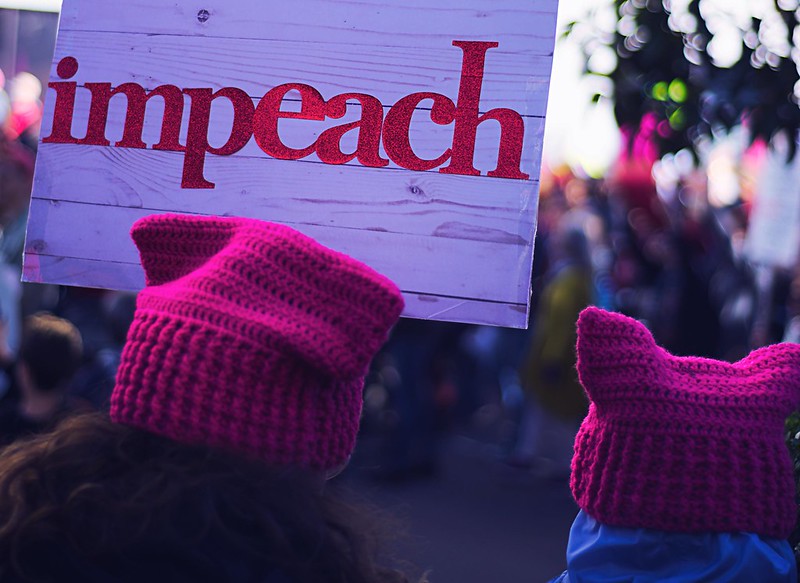 Max Price / Flickr
Max Price / Flickr
What follows is a conversation between author and activist David Samson and Marc Steiner of The Real News Network. Read a transcript of their conversation below or watch the video at the bottom of the post.
Marc Steiner: Welcome to The Real News, folks. This is Marc Steiner. Good to have you with us.
So the impeachment hearings conducted by the House Intelligence Committee seem to have come to an end. And while some may argue there’s no smoking gun evidence for a quid pro quo, some people say there’s clearly enough testimony that the smoking gun existed. But where is it? Most of the testimony has confirmed that Donald Trump and his team, from Giuliani to Sunderland, threatened not to release military aid until the Ukrainians agreed to investigate Joe Biden and Hunter Biden.
Okay, so some were riveted by this in our multi-verse of 21st-century media, but many were not watching. It goes now to the Judiciary Committee, which will write up articles of impeachment. The vote will happen. He’ll probably be impeached. The Senate will hold a trial. Trump won’t be convicted. And where will we be? Well into the 2020 elections. What does all that mean? And where does all this take us?
David Swanson, Author, Activist, Co-Founder of War Is A Crime, whose work can be found at his website, davidswanson.org, Let’s Try Democracy. He’s with us now to talk through some of that from his perspective. So welcome, David. Good to have you with us.
David Swanson: Hi, Marc. Thanks for having me.
Marc Steiner: Good to have you back. Good to see you again. So let’s look at this clip. This is kind of a montage of things that happened at the impeachment, to kind of set the tone for this conversation.
Speaker 3: Was there a quid pro quo? As I testified previously with regard to the requested White House call and the White House meeting, the answer is yes.
Speaker 4: A member of my staff asked Ambassador Sondland what President Trump thought about Ukraine. Ambassador Sondland responded that President Trump cares more about the investigations of Biden, which Giuliani was pressing for.
Speaker 5: I became aware that Hunter Biden was on the board of Burisma. Let me be clear, however, I did not witness any effort by any US official to shield Burisma from scrutiny.
Speaker 6: Ambassador Bolton cut the meeting short when Ambassador Sondland started to speak about the requirement that Ukraine deliver specific investigations in order to secure the meeting with President Trump. I stated to Ambassador Sondland that this was inappropriate and had nothing to do with national security.
Fiona Hill: Let’s say he said that he had an agreement with Chief of Staff Mulvaney that, in return for investigations, this meeting would get scheduled.
Speaker 8: After both meetings, when you spoke to him and relayed to him what Ambassador Sondland said, what did Ambassador Bolton say to you?
Fiona Hill: A specific instruction was that I had to go to the lawyers, to John Eisenberg, our senior counsel for the National Security Council, to basically say, “You tell Eisenberg …” Ambassador Bolton told me, “… that I am not part of whatever drug deal that Mulvaney and Sondland are cooking up.”
Speaker 8: What did you understand him to mean by the drug deal that Mulvaney and Sondland were cooking up?
Fiona Hill: I took it to mean investigations for a meeting.
Speaker 9: At the closed deposition, I expressed grave concerns as foreign and corrupt interests apparently hijacked our Ukraine policy.
Speaker 10: The three priorities of security, economy, and justice became overshadowed by a political agenda promoted by former New York City mayor, Rudy Giuliani, and a cadre of officials operating with a direct channel to the White House.
Speaker 11: We did not want to work with Mr. Giuliani. If we refused to work with Mr. Giuliani, we would lose a very important opportunity to cement relations between the United States and Ukraine. So we followed the president’s orders.
Marc Steiner: So David, this is just a montage of some of the things that came out. And we’re going to play a little bit of what happened yesterday because I think people say that’s the most significant day. We’ll talk about that in a moment. But so, overall, talk about the issues you see with this as you listen to what they put out. As I said earlier in the opening, many folks were arguing, that I’ve talked to, that there’s kind of no smoking gun there, but there is something there. So give us your analysis of that.
David Swanson: Well, if I were impeaching Trump and removing him from office, I would be impeaching him for perhaps the few worst impeachable offenses. If I were going to do a complete list, I would get through hundreds before I got to Ukrainegate.
Marc Steiner: Where would you start?
David Swanson: Well, for one thing, look how ludicrous it is for there to be any doubt, any question, whether Trump is guilty of an offense when this is someone who, from day one, has been guilty of violating both of the emoluments clauses, with levels of corruption and types of corruption never seen before in the White House. Literally, thousands of conflicts of interest in violation of the US Constitution. And there’s not any question whether those facts exist or not. This is a president who has pardoned a racist, murderous sheriff in Arizona, has told border guards, “Commit crimes, I’ll pardon you,” who has pardoned horrible war crimes. There’s not a question, “Did he issue these pardons, or didn’t he?” He did.
You take a president who has engaged in numerous illegal wars, escalated several of them, escalated drone murders, threatened nuclear war against two countries, supported coups in Venezuela, Bolivia, etc, and then you impeach him exclusively for failing to escalate a war in Ukraine with Russia. That’s a sort of insanity that our system is dealing with. I mean, a president who takes children away from families, who publicly incites racist violence, who declares official emergencies explicitly in violation of congressional policies, to spend funds he’s not allowed to spend. This is a president openly engaged in intentionally exacerbating climate collapse. And none of this is brought in.
Marc Steiner: But the question I have, I hear what you’re saying, I mean, and especially what you first iterated when you talked about the emolument clause issues. I mean, those I think, many of us would argue back then that those were impeachable offenses. I mean, the rest of most of what you talked about were things that you can oppose politically, but they’re not necessarily impeachable offenses, even in partisan warfare, I mean, sometimes … People use the argument that you couldn’t take Al Capone down for all the criminality he did, so you took him down on his income taxes. So I mean, so don’t people have to … people who are going after him, are going after him because this is the way thy think they can get him.
David Swanson: Well, the reason that the precedent is that they got Nixon on his income taxes rather than on Vietnam, and they got Clinton on lying about sex rather than on his wars and his various outrages, that’s congressional choice. That’s not something that’s written into the Constitution. I mean, you can impeach Donald Trump for what you choose to impeach him for. And if you and I and the most people can agree on the emoluments clauses, why is it that the Democratic leadership can’t? And why not impeach him a couple of years back? Why wait until now? Because, very clearly, the purpose is not to halt his outrages, it’s not to stop his destruction of the climate or anything else, by getting him on his income taxes. It’s to make him look bad slowly, keep him in office, not risk removing him, and run in an election against damaged goods. This is the thinking from people who are 24/7, 365 a year obsessed with elections, not with protecting us from a criminal president.
Marc Steiner: But also, before I show this next clip, also, they couldn’t really do anything until this Congress. When Democrats actually had a majority, then they could do it. It wouldn’t have happened before that anyway. I mean, it could only happen now. The question is, I mean, part of the argument that people have been having back and forth, if constitutionally, it’s not easy to impeach a president, they have to really do something that is impeachable. And so folks can argue this was the first time they had a chance to do that. But that’s something you say is wrong.
David Swanson: Well, first of all, partisanship is also a choice. Past impeachments have not been strictly partisan. There is no reason you can’t move an impeachment from the minority or in a split Congress. But the Democrats have had the majority since the beginning of this year. And here we are, many months later, and they’re dealing with something that they haven’t quite proved to everyone’s satisfaction, instead of quintessentially indisputable. And I mean, when Congress says, “You cannot have this money for this wall,” and Trump says, “I’ll declare a phony emergency in order to take it anyway,” what is Congress supposed to do? There is not an option for Congress, other than impeachment.
And they choose not to impeach over all of these offenses that are just beyond dispute public acts, and they go after something that’s secret. Look how annoyed they were when, the next day after they raised this issue, Trump publicly asked China to dig up dirt on Joe Biden, and that just about ruined everything for them because it was public. They want something secret. They want something they can dig after. It takes longer. It leaves doubt. And it avoids a conviction in the Senate.
Marc Steiner: Well, there probably would never be a conviction in the Senate given how the Senate is controlled. That’s not going to happen no matter what. As Trump famously said, “I can shoot somebody on Fifth Avenue, and nobody’s going to do anything.” The Senate is not going to convict him. And this whole impeachment-
David Swanson: If you held effective, persuasive public hearings on indisputable impeachable offenses, including separating kids from their parents and locking them in cages, including the financial corruption, profiting from the office of the presidency, and went through 30 or 40 of them, and watched Trump’s ratings plummet through the process, I wouldn’t swear you couldn’t get a conviction. Yes, it’s unlikely. It’s not impossible. And the steps to make it more likely are not being taken.
Marc Steiner: Well, let’s move on to this other thing. I think, I mean, that’s a really interesting argument to be had. I don’t have the faith that the far right is going to convict him and push him out when they can use Trump so easily to fill up the courts and do what they need to in this country. I don’t think they’re going to come along with liberal, progressive, or radical Democrats, whoever they may be, to take their boy out when their boy is doing their bidding. I think that’s-
David Swanson: They take their boy out when there’s a risk of the public taking them out. And that requires a better impeachment campaign than what we are seeing right now.
Marc Steiner: So let’s talk about this impeachment campaign. Let’s just kind of pick it apart a bit. Let’s look at this. This is a clip, Fiona Hill talking about Bolton. We’ll start with this one and look at another one because they’re both around the same kind of issue.
Speaker 12: Dr. Hill, was it apparent to you that when President Trump, Rudy Giuliani, or anyone else was pushing for an investigation into Burisma, that the reason why they wanted that investigation, related to what President Trump said here, the Bidens?
Fiona Hill: It was very apparent to me that that was what Rudy Giuliani intended, yes.
Speaker 12: And Mr. Holmes, you also understood that Burisma was code for Bidens?
David Holmes: Yes.
Speaker 12: And do you think that anyone involved in Ukraine matters in the spring and the summer would understand that as well?
David Holmes: Yes.
Speaker 12: Now, toward the end of this meeting, the Ukrainians raised their ongoing desire for an Oval Office meeting. Is that right?
Fiona Hill: That’s correct.
Speaker 12: And what happened after they did that?
Fiona Hill: Ambassador Sondland leaned in, basically to say, “Well, we have an agreement that there will be a meeting. Specific investigations are put underway.” And that’s when I saw Ambassador Bolton stiffen. I was sitting behind him in the chair and I saw him sit back slightly, like this. He’d been more moving forward like I am, to the table. And for me, that was an unmistakable body language, and it caught my attention. And then he looked up to the clock and at his watch, or towards his wrist in any case, again, I was sitting behind him, and basically he said, “Well, it’s been really great to see you. I’m afraid I’ve got another meeting.”
Marc Steiner: So that’s the first part. And let me just play the second part real fast for all of us, so we can kind of look at that and see what you think, if there’s a there, there. This has to do with the piece that many people think, where Fiona Hill fried him. We’ll see if that’s correct.
Fiona Hill: I will say for the record that the president has a perfect right to remove any ambassador at any time, for any reason. And then on the second front, it was very clear at this point that there was, let’s just say a different channel in operation, in relations to Ukraine. One that was domestic and political in nature, and that was very different from the channel, or the loop, however you like it, that I and my colleagues were in, where we were focused on bilateral relations and the US foreign policy towards Ukraine. And these two things had diverged at this point.
Marc Steiner: So, as many people, people have written that [inaudible 00:13:04] find a smoking gun. But so, what do you think of this testimony, David? I mean, is it convincing? Does it point to an interaction, or from your analysis, does it not?
David Swanson: It’s certainly convincing enough for an indictment, which is what an impeachment is. And then you go to trial in the Senate. I mean, that level of proof has been reached. There is no question. My concern is, number one, that you’re getting Al Capone on something much less than his tax returns, and that this is being used to push Russiagate and to pretend that Ukrainegate didn’t replace a failed Russiagate that stalled impeachment for years, but rather, is being piled on top of it as if it had been proven, and the damage that that does to international relations and to the US public’s thinking about foreign policy.
Those are my concerns with this. But certainly, this is sufficient to impeach somebody in that office. And were there a president who wasn’t Donald Trump, and this was the worst thing that he or she was doing, I think it would be grounds for impeachment.
Marc Steiner: But, clearly, it’s not the worst thing he’s done. I mean, I think that we’re in total agreement about that. The question is, where will this take all of this? And I think some of the troubling things that some people will have with this … And this is an interesting piece. This is Fiona Hill in her opening statement, where she is talking about the foreign policy issues, and Ukraine and Russia. And this is very telling. But let’s talk about this. This is what Jeet Heer, in his piece in The Nation, kind of really focused in on.
Fiona Hill: I take great pride in the fact that I’m a non-partisan foreign policy expert who has served under three Republican and Democratic presidents. I have no interest in advancing the outcome of your inquiry in any particular direction, except toward the truth. The unfortunate truth is that Russia was the foreign power that systematically attacked our democratic institutions in 2016. The impacts of the successful 2016 Russian campaign remains evident today. Our nation is being torn apart. Truth is questioned. Our highly professional and expert career foreign service is being undermined.
Marc Steiner: So I mean, what hit me about this particular piece, and let’s talk about this for a moment, because this is clearly in the impeachment inquiry, but it says something much larger when she said, when Dr. Fiona Hill said she was not a partisan. But clearly, in this statement and in her push in this, this was a very partisan statement that comes from across party lines, about what they want to confront and how they want to confront it.
David Swanson: Well, anyone can declare that they are honest and unbiased and speak only the truth, and then make their assertions. But these are unproven assertions that the US government put everything it had into proving for years, and came up short. And here, they’re being slipped into an impeachment hearing about a different topic that they’re pursuing because there is more evidence related to it. And so, that’s a problem with this whole impeachment hearing, as I said, that they’re bringing Russiagate into it as if that hadn’t been the major failure that delayed this for years.
And it’s just ludicrous. The United States has an election system that put Trump in office with fewer votes than his opponent, that is just completely corrupted by corporate media and by money, by bribery that’s been legalized, that has gerrymandering and racist stripping of people from voting rolls, and long lines and ID requirements that deny people the vote. It’s just broken in dozens of ways. And to explain that Russia has somehow systematically assaulted this pristine democratic system by buying a handful of weird Facebook ads that didn’t convince anybody to do anything, I mean, it’s just ludicrous. But it goes to the partisan motivation here, which is to blame Russia for the last election, which far outweighs any motivation related to doing people’s jobs as Congress members or protecting us from a criminal and abusive presidency.
Marc Steiner: So David, talk about, from your perspective, politically, and from a left and progressive perspective, where do you think this takes us? So the impeachment is going to happen, [inaudible 00:17:26] go to judiciary, they’ll probably convict. It’ll go the Senate. So politically, where does this move us? How does this move the ball?
David Swanson: I think it moves the US public toward an ever more militant anti-Russian, pro weapons dealing foreign policy, regardless of partisanship. I don’t think it accomplishes very well the goal of making Joe Biden look good. That’s been another … The purpose here is to blame Russia, make Trump look bad, make Biden look good. I think it leaves things pretty much where they were in that regard because there won’t be a conviction, almost certainly, unless they expand the impeachment to include more persuasive charges. And you end up with a similar election to what you would have had before, for people who are intent on doing everything to manipulate the upcoming election. So I think the Democrats would be better off thinking less about the next election, doing their jobs, doing them seriously, and would find in the end that that actually benefited them in the next election.
Marc Steiner: Yeah, I mean, I guess one place where we’re not quite on the same line here is that I’m not very sanguine about the idea that the Republican-controlled Senate would ever impeach Trump, because he does their bidding and does it so well in terms of what he’s done in this country so far around the court system and more. But I mean, that’s a debate we could have. We could see how this unfolds, if that even gets to that point. But in the overall picture here, it just seems that the impeachment is, some people would argue that it would have been stronger for the Democrats in the House to go after him piece by piece and censure him for all these things that they might not be able to find enough to impeach him on, but can expose the underbelly of what’s happened to this country via Trump.
David Swanson: See, and here’s where I want him impeached, is for things that you don’t have to find anything on. When he declares a ban on Muslims and enacts that policy, it’s a public act. When he takes actions to incite racist violence with his voice and with his Twitter feed, these are public acts. You don’t have to go find anything. When he declares that the United States is engaged in a war in Syria exclusively to steal that country’s oil, you don’t have to go find anything. He’s stating that publicly. He’s laying that out before you on a silver platter. But you don’t want it, you shove it away, and that we must go find something that needs more investigation, in hopes that we can investigate it and never get to the bottom of it, but still make him look bad or censure him. I want him impeached and removed from office for public acts that are beyond dispute.
Marc Steiner: Well, we’ll see how this unfolds for us in the coming weeks and months. I look forward to getting you back here to talk about this, because really, to me, one of the most important issues here is how people on the left and how progressives and others in this country confront what we’re being confronted by with this Trump administration, and what the response should be, wherever this impeachment goes. But I appreciate your work and writing, David. And always good to have you with us, David Swanson. We’ll have you back very soon. And we’ll see where this goes.
David Swanson: Same to you. Thanks, Marc.
Marc Steiner: Take care, my friend. And I’m Marc Steiner here for The Real News Network. Thank you all for joining us. Please let us know what you think. There’ll be more of this, unfortunately. We’ll have to keep showing you and talking about it, and finding out where this takes us as a nation. Take care.
Your support matters…
Independent journalism is under threat and overshadowed by heavily funded mainstream media.
You can help level the playing field. Become a member.
Your tax-deductible contribution keeps us digging beneath the headlines to give you thought-provoking, investigative reporting and analysis that unearths what's really happening- without compromise.
Give today to support our courageous, independent journalists.
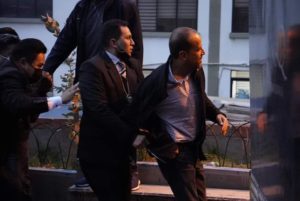


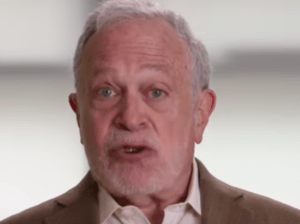
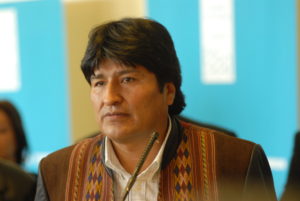
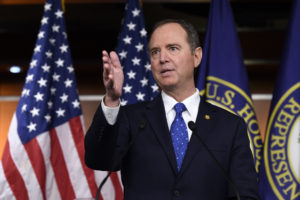
You need to be a supporter to comment.
There are currently no responses to this article.
Be the first to respond.